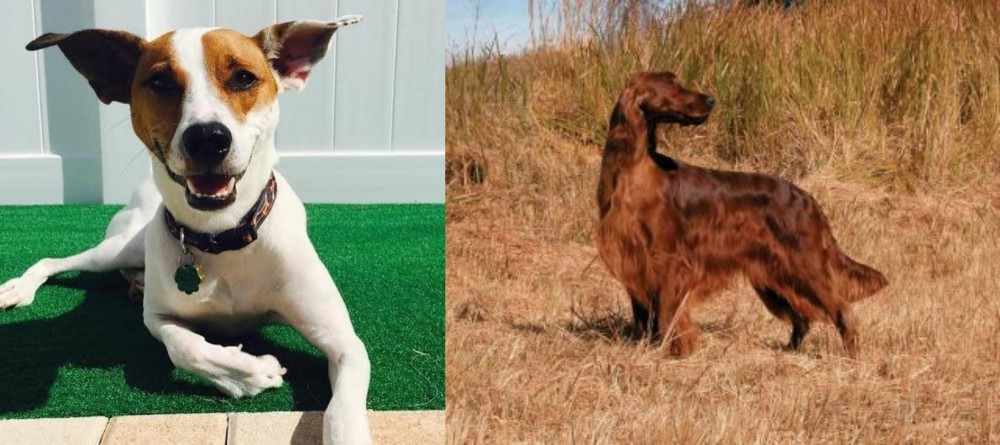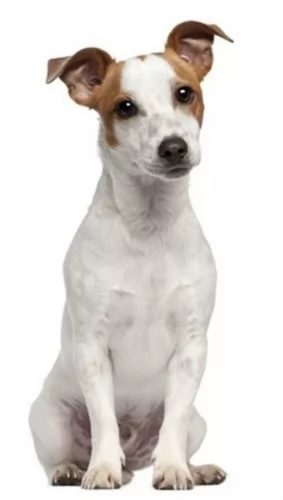 Petzlover
Petzlover Feist is originated from United States but Irish Setter is originated from Ireland. Feist may grow 15 cm / 5 inches shorter than Irish Setter. Feist may weigh 19 kg / 41 pounds lesser than Irish Setter. Feist may live 3 years more than Irish Setter. Feist may have less litter size than Irish Setter. Feist requires Low Maintenance. But Irish Setter requires Moderate Maintenance
Feist is originated from United States but Irish Setter is originated from Ireland. Feist may grow 15 cm / 5 inches shorter than Irish Setter. Feist may weigh 19 kg / 41 pounds lesser than Irish Setter. Feist may live 3 years more than Irish Setter. Feist may have less litter size than Irish Setter. Feist requires Low Maintenance. But Irish Setter requires Moderate Maintenance
 The Feist is a small dog from the United States, coming from Terrier dogs which were brought over to the States. It is believed that these Terriers included crosses between several terriers – the Manchester Terriers, Smooth Fox Terrier and English White Terrier – dogs used as ratters and known for their skills in killing rats.
The Feist is a small dog from the United States, coming from Terrier dogs which were brought over to the States. It is believed that these Terriers included crosses between several terriers – the Manchester Terriers, Smooth Fox Terrier and English White Terrier – dogs used as ratters and known for their skills in killing rats.
The Feist isn’t a new type of dog and in fact there are records of the dog which go back centuries. George Washington even referred to them in 1770 already, and the breed was popularized by President Teddy Roosevelt, who hunted with his Feist.
 The Irish Setter is a gun dog, originating in Ireland and recognized by his beautiful red or mahogany coat.
The Irish Setter is a gun dog, originating in Ireland and recognized by his beautiful red or mahogany coat.
Descending from the Setter group, the Irish Setter, also known as the Red Setter, has a solid pedigree. It was in the 1800s that they were brought to the United States.
The Irish Setter wasn't always what it looks like today and in fact the solid red color was created because of selective breeding practices. The Irish Setter has long medium length floppy ears, brown eyes and he is deep chested.
 Standing at about 46cm to 56cm in height and weighing in the region of 10 to 15kg, the Feist is a short haired dog that doesn’t shed much and he is not hypoallergenic.
Standing at about 46cm to 56cm in height and weighing in the region of 10 to 15kg, the Feist is a short haired dog that doesn’t shed much and he is not hypoallergenic.
The coat of the dog is available in a variety of colors but they are essentially a bi-colored dog such as red and white, tan and white, black and white, while solid colors are fawn, white, light brown, black and brindle too.
Perhaps because of so many genes being involved with this dog, it is more easily identified because of its hunting abilities. He is a sturdy dog with a medium length tail which he holds up. Some Feist owners prefer the look of a docked tail and then docking is between the second and third joint of the tail. The Feist has erect or semi-erect ears.
Intelligent and alert, the Feist is a dog that will respond well to training. As with any other dog, training and socialization will be important for him so that he is obedient. He is energetic, curious and alert and above all he wants the attention of his human family.
 The Irish Setter is a large dog, beautiful and elegant looking, standing at 61 to 71cm in height and weighing anything from 25 to 34kg, males and females.
The Irish Setter is a large dog, beautiful and elegant looking, standing at 61 to 71cm in height and weighing anything from 25 to 34kg, males and females.
The coat is a rich red color and is short to medium length but feathers in places such as the tail, the chest and abdomen, the legs and the tail. The head is long and lean, the ears are long and silky and the tail long and feathery.
The Irish Setter is a playful, friendly, sweet, mischievous, high energy dog who makes a superb family pet, getting on well with children in the home.
It was noticed that in about 1845, Setters in Ireland were mostly red, red and white or even a mustardy-lemon type of color, but there was preference for the solid red coloring. The breed standard for the modern Irish Setter was drawn up in Dublin by the Irish Red Setter Club and approved in 1886.
The dog was essentially bred for hunting game birds, using their excellent sense of smell to locate the bird. He is an alert, intelligent dog and will learn easily. Training and socialization will make him obedient and relaxed.
He isn't an assertive kind of breed and therefore isn't going to make the best of watchdogs. They've got such amicable, kind temperaments that they make popular therapy dogs.
 Loving to be around his human family and being a devoted and loyal canine friend, the Feist is also an intelligent, energetic dog who is fairly easy to train.
Loving to be around his human family and being a devoted and loyal canine friend, the Feist is also an intelligent, energetic dog who is fairly easy to train.
Bright and alert he makes a good watchdog too, but is amicable enough to get on well with other pets in the home as well as with children.
He can be stubborn so training and socialization will be important for him. As it is, he likes a firm, strong owner and in exchange for good care, he will become your devoted, loyal friend.
 Irish Setters are going to make you a wonderful pet. He has a friendly, confident disposition that makes them ideal pets for families with children who have been taught how to respect- and be kind to animals.
Irish Setters are going to make you a wonderful pet. He has a friendly, confident disposition that makes them ideal pets for families with children who have been taught how to respect- and be kind to animals.
He is a big dog, but with training and socialization he becomes well behaved and obedient. Social and outgoing, this is a dog which just loves the companionship of their human family and will require a good deal of exercise too.
Keep him well exercised, feed him good food that promotes health, give him a nice warm, dry place to sleep and he’ll fit perfectly well into your family and make a splendid pet.
 A Feist is a robust dog who doesn’t have any particular health issues, and with good care he can reach 18 years of age if looked after well. Hip Dysplasia is such a common dog illness that it always bears mentioning.
A Feist is a robust dog who doesn’t have any particular health issues, and with good care he can reach 18 years of age if looked after well. Hip Dysplasia is such a common dog illness that it always bears mentioning.
This is a ball and socket joint problem where the joint doesn’t function smoothly and the grinding of the bone leads to pain and arthritis for your pet. You'll notice he battles to play games anymore and he also battles to get up after lying down. You need to know that this disease isn’t reserved for old dogs but can start while your dog is still a puppy and that it can lead to lameness.
Look out for allergies in your dog as they can cause a host of problems which can include his skin, his breathing and problems with digestion. Typical symptoms of a dog with allergies include sneezing,scratching and very distressing for a dog, itchy and red skin which can eventually ooze.
As a responsible dog owner it is imperative when you detect problems with your dog, to get him to the vet immediately.
 Irish Setters are quite a healthy breed but they are also prone to getting some of the common dog illnesses such as hip dysplasia, cancer, bloat and canine leukocyte adhesion deficiency.
Irish Setters are quite a healthy breed but they are also prone to getting some of the common dog illnesses such as hip dysplasia, cancer, bloat and canine leukocyte adhesion deficiency.
Known as CLAD, this is a disease of the immune system found in Irish Setters. True, it is a rare disease and affected animals show signs of skin lesions, bone disorders, anorexia and generalized lymphadenopathy.
Irish Setters can develop bloat, a life-threatening condition where the stomach distends with gas and can twist. This is known as gastric torsion and you’ll see your dog’s restlessness. He may even ‘hide away’ somewhere, lying down and drooling, while trying to vomit. This is an illness which requires immediate veterinary intervention.
 Grooming your Feist dog isn’t going to be costly or difficult at all, as with his short, smooth coat he will essentially only require a brush twice a week.
Grooming your Feist dog isn’t going to be costly or difficult at all, as with his short, smooth coat he will essentially only require a brush twice a week.
It’s good to get into the habit of brushing him as not only does it keep his coat sleek and shiny, he loves you paying him attention.
All dog owners need to know that grooming goes beyond just brushing the coat. You want to also check his nails that they are short, check in and around his ears and brush his teeth with special dog toothpaste and toothbrush.
Give your Feist the very best dog food there is. Home-made is always good but if you feed him commercially manufactured food, make sure its a quality one. Some raw meat added in every now and again is important for his health. Ensure fresh, cool water is available to him around the clock.
Your Feist is an energetic dog that has been accustomed to hunting and running down small prey. He is an outdoor dog, thriving on fun and games. Take him on your walks, your hikes or when you go cycling or swimming. He wants to be right there with you involved in everything. While he can slot into life in the city or the countryside, he isn’t an indoor dog and it certainly won’t be good for him if you keep him cooped up in a tiny garden and pretty much forget about him.
 Irish Setters are lean and muscular and an active breed. They love nothing more than to run off in wide open spaces, and if you live in the city and have a large garden, he will need to be taken on long walks. If he is a country dog, he may well run off and be gone for an hour or two before he returns home.
Irish Setters are lean and muscular and an active breed. They love nothing more than to run off in wide open spaces, and if you live in the city and have a large garden, he will need to be taken on long walks. If he is a country dog, he may well run off and be gone for an hour or two before he returns home.
They are dogs which are used to having a job to do such as hunting, so he won't do well if he is put into a small back yard and left to his own device. He is a social dog and wants to be with his human family, relying on them to include him in all their activities.
Your Irish Setters is a lean, muscular, active dog, and to keep him that way he will require a nutritious diet. If you feed him commercially manufactured kibble, make sure it is the very best quality one. It is a good idea to mix in protein such as cooked chicken, brown rice and vegetables. Some raw meat added in from time to time can be very beneficial to him too.
With your beautiful Irish Setter, it is best to avoid feeding your dog processed foods altogether. A good diet is essential for good health. Never leave your dog without a constant supply of cool, fresh water.
The Red Setter’s coat is fairly long on the body but short and smooth on the head. The coat will need to be brushed at least twice a week to prevent matting.
Trim his nails as needed, and find out how to keep his teeth healthy too with vet approved canine dog toothpaste- and brush.
Also check his long, floppy ears because it is so easy for ear infections to develop with these long-eared dogs.